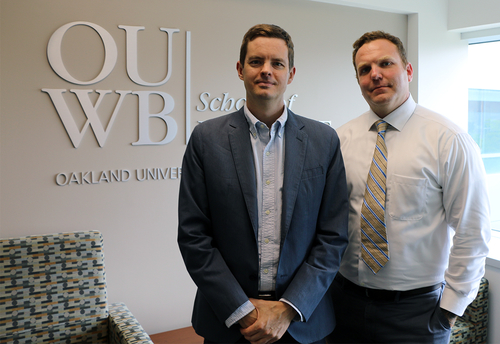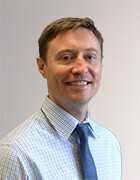
Anyone involved in moral disagreements or ethical uncertainties at Beaumont Hospital, Royal Oak, can now tap the expertise of a team of bioethics educators from Oakland University and Oakland University William Beaumont School of Medicine.
The hospital announced in late May that the Clinical Ethics Consultation Service is available to any of its physicians, nurses, patients, and family members of patients — along with anyone else in need of an ethics consultation and involved in patient care.
The team is led by Jason Wasserman, Ph.D., associate professor, Abram Brummett, Ph.D., assistant professor — both from OUWB’s Department of Foundational Medical Studies — and Mark Navin, Ph.D., professor and chair of Philosophy at OU.
The primary aim is to provide assistance with common clinical ethics issues including, but not limited to, a patient's welfare versus the patient's right to make treatment decisions, extending the life of the patient versus ensuring comfort as the primary goal, and honoring family requests to withhold information from the patient versus the patient's right to know.
It’s also another example of OUWB and OU students getting the benefit of learning from educators who can draw from real life.
Brummett |
“For me, I feel it makes me such a better instructor,” said Brummett. “We come up with models and ways to theorize clinical ethics, but reality constantly finds new ways to break our models.”
“I’m able to draw on cases and describe them to students so that they can ask themselves ‘What would I do in this situation?’” he said.
“When students ask questions and you can go ‘Let me answer that by talking to you about a case I had just last week,’ the credibility of that is invaluable,” said Wasserman.
Navin, who primarily teaches OU undergraduate students, said it’s “hand in glove” with his work at OU.
“It’s invaluable to be able to share with my students real world cases and real world experiences of how the ethics issues we’re talking about in the classroom matter in the clinic,” said Navin.
“It also creates a direct line between the consultation work and my research, which has further informed my role as a scholar educator in the classroom.”
According to Wasserman, the service is available via consult order, voicemail, or email, Monday through Friday, 8 a.m. to 5 p.m. The team promises to respond to requests within 24 hours. The three rotate as lead contact throughout the month.
Once a request for a consultation is placed, the team — which also includes representatives from spiritual and clinical care — will conduct an interdisciplinary analysis. Recommendations on the ethical courses of action will be entered in a patient’s chart.
Ethics service team members are available throughout the process and after to debrief with staff regarding any concerns.
“A lot of times we have to do at least two things,” said Brummett. “We have to be able to determine who ought to make a decision for a patient, and we also have to determine what options are on the table for the decision maker. Both of those things are ethically charged questions.”
Navin said one example might be a question on how to handle a 90-year-old patient who could require CPR yet faces numerous other health-related issues. Another example could be a situation where a very young person essentially gets to call the shots on a grandparent’s treatment.
“We respond, listen, facilitate discussions, and make recommendations that are obligatory, or things you have to do…or things you could do…or things you shouldn’t do,” said Navin.
In addition to the daily services, the team is offering free ethics education lectures that are set to be held online, monthly. They also will provide tailored clinical ethics educational presentations to inform and support Beaumont Hospital, Royal Oak teams.
Wasserman said he and Navin have been serving as volunteer consultants for the last four years. Brummett, who joined OUWB in 2020, also has volunteered since joining the school.
The efforts were amplified during the COVID-19 pandemic. Having a formal relationship ensures the hospital is well-covered with regard to ethical uncertainties that might arise.
In terms of the success of the Clinical Ethics Consultation Service, Wasserman said that can be hard to measure, but not impossible.
“Our biggest measures of success are that we make patients’ and families’ often difficult experiences a little less difficult,” he said. “We also make the moral distress that physicians, students, residents, and nurses often feel in these cases, a little less distressing.”
For more information, contact Andrew Dietderich, marketing writer, OUWB, at [email protected].
To request an interview, visit the OUWB Communications & Marketing webpage.
NOTICE: Except where otherwise noted, all articles are published under a Creative Commons Attribution 3.0 license. You are free to copy, distribute, adapt, transmit, or make commercial use of this work as long as you attribute Oakland University William Beaumont School of Medicine as the original creator and include a link to this article.


